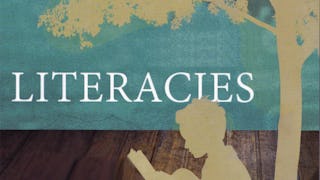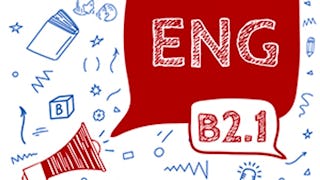You are interested in welcoming processes of migrants and refugees? You want to dedicate yourself to teaching lamguage and literacy? The objective of this course is to get to know the simultaneous process of literacy and language learning in the host society for migrated young people and adults.

Profitez d'une croissance illimitée avec un an de Coursera Plus pour 199 $ (régulièrement 399 $). Économisez maintenant.

(10 avis)
Compétences que vous acquerrez
- Catégorie : Oral Comprehension
- Catégorie : Literacy
- Catégorie : Student-Centred Learning
- Catégorie : Language Learning
- Catégorie : Teaching
- Catégorie : Intercultural Competence
- Catégorie : Social Sciences
- Catégorie : Multilingualism
- Catégorie : Instructional Strategies
- Catégorie : Pedagogy
- Catégorie : Diversity Training
Détails à connaître

Ajouter à votre profil LinkedIn
3 devoirs
Découvrez comment les employés des entreprises prestigieuses maîtrisent des compétences recherchées

Il y a 4 modules dans ce cours
The aim of this course is to learn about international migration and the experiences of immigrants in the receiving societies, as well as to train trainers to guide them in simultaneous processes of language and literacy learning, as an essential need for social integration in the host society.
Inclus
1 vidéo8 lectures
This module provides a general overview of international migration and social integration in 21st century Europe and the essential role of languages in it. Topics covered:<br>1. HUMAN MIGRATION AND MOBILITY:<br> a) Migration flows, regions and types.<br> b) Rights, regulations and migrants’ profiles.<br> c) Super-diversity, cities and refugees in Europe.<br>2. BORDERS AND LANGUAGES:<br> a) Reception systems for newly arrived migrants and asylum seekers and language provisions.<br> b) Immigrants’ experiences, interactions and language learning.<br>3. UNDERSTANDING SOCIAL INTEGRATION:<br> a) Integration models alongside history, with a particular focus on the intercultural approach.<br> b) Intersectionality, belonging and bordering .
Inclus
4 vidéos5 lectures1 devoir
This module aims at providing a general overview of the students’ and teachers’ profile. Topics covered:<br>1. EXPECTATIONS AND NEEDS from students in relation to integration (i.e. staying or leaving the country; working; studying) and language. <br>2. PLURILINGUAL COMPETENCE (which are the students’ communicative practices? Which languages they already use? In which contexts? To reflect on key concepts to describe communicative competence of migrant and refugee students (Plurilingualism, translanguaging, superdiversity…)<br>3. STUDENTS’ BARRIERS to access language and education rights beyond classroom methodology. For example: enough number of courses; gender-related lack of ”awareness”/discrimination, system knowledge barriers; legal status; gaps in the educational system; policies to discourage to remain, mobility issues, linguistic diversity lack of awareness (e.g. the role of literacy in mother tongue). <br>4. TEACHERS’ PROFILES: expectations, working conditions, ideologies, training, expertise… in relation to ORALPHA methodology and NEEDS of training. <br>5. TEACHING COMPETENCIES: (i.e. adaptation skills, how to overcome stereotypes; gender issues; to value previous language
Inclus
7 vidéos4 lectures1 devoir
This module aims at providing a general overview of the theoretical basis that is beyond L2 literacy classes. Topics covered:<br>1. L2 THEORY on second languages teaching and the specificities of low educational background students.<br>2. LITERACY THEORY, main theories of literacy teaching and the specificities of L2 teaching to people with a mother tongue that differs from the host language.<br>3. WAYS OF LEARNING, illiterate people ways of learning and ways to develop reading and writing skills. <br>4. ORAL SKILLS the importance of oral skills development in the L2 literacy class; specifics mechanisms to promote the orality in L2 literacy lessons<br>5. GROUP DYNAMICS, the importance of emotions and socialization in L2 literacy class; specifics mechanisms to promote group cohesion, motivation, self confidence, etc. In L2 literacy lessons. <br>6. INTERCULTURAL COMPETENCES L2, the importance of introducing intercultural approach (students, teachers and materials).
Inclus
10 vidéos4 lectures1 devoir
Offert par
En savoir plus sur Other Languages
 Statut : Prévisualisation
Statut : PrévisualisationUniversity of Illinois Urbana-Champaign
 Statut : Prévisualisation
Statut : PrévisualisationUniversiteit Leiden
 Statut : Prévisualisation
Statut : PrévisualisationUniversità di Napoli Federico II
 Statut : Prévisualisation
Statut : PrévisualisationUniversity of Illinois Urbana-Champaign
Pour quelles raisons les étudiants sur Coursera nous choisissent-ils pour leur carrière ?




Foire Aux Questions
To access the course materials, assignments and to earn a Certificate, you will need to purchase the Certificate experience when you enroll in a course. You can try a Free Trial instead, or apply for Financial Aid. The course may offer 'Full Course, No Certificate' instead. This option lets you see all course materials, submit required assessments, and get a final grade. This also means that you will not be able to purchase a Certificate experience.
When you purchase a Certificate you get access to all course materials, including graded assignments. Upon completing the course, your electronic Certificate will be added to your Accomplishments page - from there, you can print your Certificate or add it to your LinkedIn profile.
Yes. In select learning programs, you can apply for financial aid or a scholarship if you can’t afford the enrollment fee. If fin aid or scholarship is available for your learning program selection, you’ll find a link to apply on the description page.
Plus de questions
Aide financière disponible,













